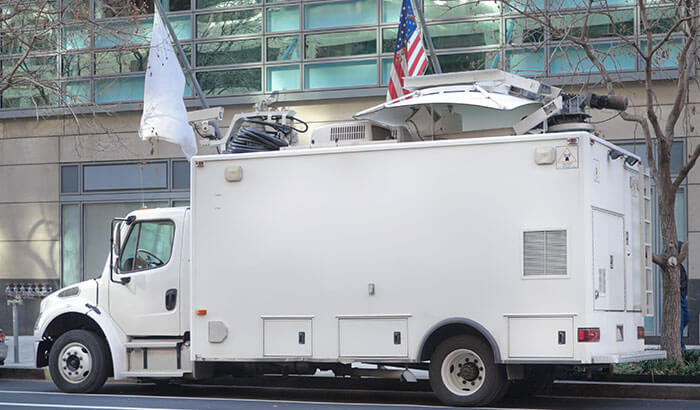Life on the road is perpetually memorialized and romanticized. Whether it’s an iconic road trip novel like Jack Kerouac’s On the Road or Willie Nelson’s legendary driving anthem, traveling long distances on the open road conjures images of carefree cruising and a soul searching, coming-of-age journey into the unknown.
At least in theory.
In practice, it’s often not as magical and awe-inspiring as it may sound, particularly when it’s less of a joy ride and more of a harsh reality. Traveling for weeks at a time, separated from friends and family, can feel like a sentence to solitary confinement. But that need not be a permanent status.
Enter television. Television has the power to bring the community to you, wherever you are, in real time. When TV follows you out onto the highway, the trip becomes infinitely more interesting—and a lot less lonely. Why?
The secret sauce to any great trip (and life in general) is companionship and memory-making. Companionship is a key ingredient for happiness—so much so that it contributes to personal well-being more than income.1 And some have argued2 that memory is even more important than actuality—or, in other words, what we remember trumps what actually happened. Pictures, post cards, souvenirs; our desire to mark our experiences and share them with friends and family is persistent, crossing cultural and other demographic boundaries. Ritualized memory-making informs our sense of identity and adds meaning to relationships.
Television programming in trucks satiates our appetite for connective memories and serves a dual purpose:
The characters become companions.
What does it mean to “be alone”? Is it merely the absence of other bodies, a lack of human contact? Or is there more to it? Being alone is less about physicality and more a mental state of being. Sherry Turkle3 reminds us that we are often “alone together,” preferring to connect with screens and absent bodies over those in our immediate presence. And yet, I argue that the inverse is also true: We can be “together alone,” filled with the spirit of companionship while in solitude. Television can help to satisfy this human need for connection. The characters on the screen fill the void of absent friends and family while out on the road. They speak to us, keep us company, and make us feel “together,” even when we are physically alone.
Their stories become our stories.
The stories that unfold on the television do more than merely pass the time. They fuel the narratives of our own lives. The trucks are 18-wheeled islands, and the programming serves as the bridge between them. Television creates a common point of connection—a shared story—to discuss at the truck stops and pontificate over the CB, to guide and animate the conversations when they call home.
Imagine for a moment that you are one of these drivers. It’s Sunday and you’re fulfilling some mandatory rest time in your truck, somewhere along a deserted stretch of road near an Iowa cornfield. The sound of cars passing in the distance is the rhythmic hum that fills the airwaves. Now imagine that same scenario, only with a front row seat for the NFL kick-off. The passing cars are replaced with the roar of enthusiastic fans and the chatter of eager commentators. You know the players by name and pride yourself on recalling their stats. You grew up with these teams and have followed them for decades. They’re family – and they’ve been the topic of conversation at more than a few family dinners. Suddenly you’re at home, with the television and its characters keeping you company. At half-time, you call home—it’s non-stop chatter for those 12 minutes. The conversation is centered on football, but the value of that quality time is anything but trivial.
After the game, you head to a truck stop for some dinner. The faces at the counter aren’t familiar, but their stories are. They’re reminiscing about the game—the extraordinary plays, the unbelievable calls. You dive into the post-game fray with your own play-by-play analysis and season predictions. It’s family mealtime all over again. Spontaneous camaraderie erupts, with the television programming serving as a social icebreaker that establishes kinship ties amongst strangers.
And when it’s time to fuel up and head out once more, you’re not only refreshed and recharged, but you’ve also made new memories and forged new relationships, despite the confines of your truck and limited access to community—proving television actually can counteract isolation.
Televisions in longhaul trucks are not only good for truckers, they’re good for the entire trucking industry. When a driver’s quality of life is improved, his job satisfaction shoots way up. And happy drivers are more likely to stay with the fleet and on the road, season after season, year after year.4 Access to television is an affordable job perk that, through its ability to breed connectivity and foster memory-making, can dramatically improve the costly cycle of perpetual recruitment and low driver retention.
“The road is life,” Jack Kerouac said. And television has the power to make that life a little sweeter.
1. [Lane, Robert E. “Diminishing Return to Income, Companionship – and Happiness.” Journal of Happiness Studies 2(1): 103-119 (2000)]↩
2. [Norman, Donald A. “The Way I See It: Memory is More Important Than Actuality.” Interactions 16(2):24-26 (2009)]↩
3. [Turkle, Sherry. Alone Together: Why We Expect More From Technology and Less From Each Other. New York: Basic Books, 2011.]↩
4. [Medina, Elizabeth. “Job Satisfaction and Employee Turnover Intention: What Does Organizational Culture Have To Do With It?” M.A., Columbia University, 2012.]↩



